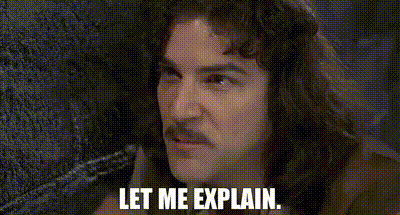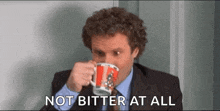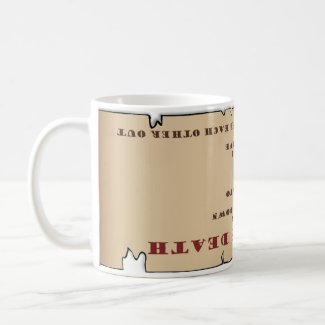What’s The Story, Muthur?
To the point, tabletop gaming
Popular Posts
Do You Call For Too Many Rolls?
Inappropriate rolling is problematic because when the dice Gods inevitably laugh in your face, the GM is left struggling to come up with a reason for the fail.
By JimmiWazEre
Opinionated Tabletop Gaming Chap
TL/DR - We like dice, they're cool, we spend a lot of money on fancy ones and we like rolling them. All that's a given. But as Game Masters we need to break the bad habit of calling for dice rolls for every little thing that our players try to do, because failed trivial actions break verisimilitude.
Introduction
As I originally conceive this, I'm currently on a flight to Amsterdam to see GreenDay live with Mrs. WazEre and I'm watching a downloaded actual play of Alien RPG to pass the time.
Or at least I was, but a particular cardinal GM sin was repeated one time too many and I felt compelled to mount my soap box…
You see, the GM kept asking for dice rolls for mundane things, like opening a door, or looking at a security card to see what's on it.
You might be thinking 'so what?!', well dear reader…
Inappropriate and excessive rolling is problematic because when the dice Gods inevitably laugh in your face, the GM is left struggling to come up with a reason for the fail.
When there's no good reason for failing an action that maintains verisimilitude, the resulting attempted explanation inevitably feels forced and awkward.
Compounding this issue, when they see something that seems otherwise simple, fail like this, the other players will start asking if they can try. You can either come up with justifications why they cannot, or allow them to roll also, but when fate curls another one out on your head from a great height, and this new character fails their roll too - Well, now the problem is exacerbated.
Why are all these characters unable to identify if this is a library card or a birthday card, and to whom it’s made out?!
We’ve created a major issue for the players sense of agency. Our dice calls have turned their characters into clowns against their will!
Everyone Is Guilty
I’ve never seen a GM not do this at some point. I used to do this too, and not so long ago that I can’t still keenly remember how uncomfortable it feels to call for a roll and then be left trying to come up with a legitimate consequence for failure. Or maybe success was actually really important for some reason, so after an unnecessary roll where the player scores a 4, I’d try to pretend like 4 was the DC all along.
Yeah, the players catch on to that and it's a cringeworthy moment.
Here’s A Fun Anecdote, That I DEFINITELY Don’t Hold A Grudge About
Going even further back, in my first game as a player, I remember my rogue (DEX = 18) out in front, creeping down some stairs with the party in tow. I was just being cautious and quiet about it, but there was no threat. However, a stealth roll was called and I scored a natural 1.
The GM then fumbled about, grasping for a severe consequence to the crit fail and ruled that I fell down the stairs.
And Just like that, ripped straight out of the moment, there went any semblance I had that my character was a competent thief.
If it’s not obvious already - There’s no need for a rogue thief to roll when creeping, unobserved down a stairwell. That’s an automatic success situation. My rogue thief walks around quietly as his day job - he’s good at it, he probably eats it for breakfast. It’s his entire reason for being.
Ironically, if I had just said I wanted to go down the stairs like the party following me had, the GM wouldn’t have called for a check, but because I said I wanted to go down cautiously, he felt like a sneak roll was required, and the failure, and subsequent desperate explanation led to a situation that turned a cool character into a joke.
Not that I’m still bitter about it or anything ;D
To Roll, Or Not To Roll? That Is The Question
This advice is applicable for every system I've ever played, and some, such as Mothership RPG and Mausritter have explicitly baked it into the rules in one form or another. However it’s often still overlooked.
So here it is, drum roll, please:
Only call for a roll if there is clear risk or urgency attached to the action. Otherwise just have characters automatically succeed or fail as appropriate - depending on how mundane the task is or if the characters backstory supports their skill in a particular action.
That reminds me - It's particularly important advice for games where you have to look for McGuffins. Recently, a chap on my socials was upset about his Call of Cthulhu adventure falling apart because his players failed their spot hidden rolls to find important clues, even with the “rule of three” - his game had ground to a halt after they’d failed their checks.
Well, now you know; the solution is to not put important clues behind dice rolls in the first place.
Perhaps Sir Would Like To See Some Examples?
These are some pretty on the nose cases where some similarly paired situations should and shouldn’t require a dice check:
If the rogue wants to unlock the shed door - he succeeds, because he’s good at this stuff, and no one’s watching, and there’s no time pressure.
If the rogue wants to unlock the kings bedroom door quickly before the guard circles back around - make a check. Failure means the guard sees you.
If the marine wants to shoot (with a tranquillizer dart, of course!) a bad guy sleeping at his desk - she succeeds, because she’s passed her basic training and she can fire a gun.
If the marine wants to shoot a bad guy on patrol and avoid alerting the base - make a roll. Failure means the bullet whips past him so he takes cover and radios for help.
If the geology professor wants to see if the Necronomicon is in the big pile of books on the messy desk - they can simply determine that because they’ve got eyes and time.
If that same geology professor wants to find the Necronomicon on the desk whilst the room is on fire - they need to make a roll. Failure means that the desk and everything on it is caught on fire before the Necronomicon is found.
You get it right?
It's a small change but it makes a huge difference to the flow of your game, not to mention that it prevents players from experiencing that sour taste that accompanies being denied something that you just know should have been a given.
A top tip
An excellent mental technique in game is to pause a moment and try to explain the consequences of failure to yourself before calling for the roll.
If you find yourself unable to come up with something that doesn’t feel contrived, don't call for the roll!
Conclusion
What do you think, do you call for too many rolls? Does your GM? Am I just wrong about this? Drop me a comment below and tell me what you think!
Hey, thanks for reading - you’re good people. If you’ve enjoyed this, it’d be great if you could share it on your socials - it really helps me out and costs you nothing! If you’re super into it and want to make sure you catch more of my content, subscribe to my free monthly Mailer of Many Things newsletter - it really makes a huge difference, and helps me keep this thing running!
Catch you laters.
These are the best death rules for your rpg
The moment a player character goes down in battle, you take a d20 and you hide it under the mug. You put the mug out on the table for all to see. For every player turn that the character remains “down” you hide another d20 under the mug. This is important, so remember to add another d20 every round…
…in my opinion
Before we get started, I want to be straight with you. This post contains links to my new online zazzle store - tldr: I designed a mug… because I’m peculiar and I think it’s funny. You don’t need to buy the mug, if you like these death rules, just use your own.
Oh, whilst I’m writing disclaimers, this D&D house rule of mine is inspired by the death rules in Mothership 1e, which is a fantastic little game by Tuesday Knight Games.
setup
You are going to need an opaque mug, cup or similar vessel, and you’re going to need a handful of d20s.
how to use the best death rules
The moment a player character goes down in battle, you take a d20 and you hide it under the mug. You put the mug out on the table for all to see. For every player turn that the character remains “down” you hide another d20 under the mug, this is important, so don’t forget!
At this point, no one knows the status of the character, all we know is that the longer they’re down, the more dice they’re getting, and the worse their odds of survival. Feel that tension baby!

The spicy bit
When another character goes to revive the downed character, be it during or after battle, using a spell or just a stabilising action, that’s when the fun begins.
The player making the revive action first shakes the mug, and reveals the d20s within. Read them as follows, with later conditions superseding earlier ones:
Condition 1) If at least 3 dice show a result of less than 11, the character is dead.
Condition 2) If any dice show a result of natural 1, the character is dead.
Condition 3) If any dice show a result of natural 20, the character is alive. (This overrules condition 1)
Condition 4) If multiple dice show results of 1 and 20, they cancel each other out. (This overrules conditions 2 and 3)
If the character is dead, the revive action fails.
Why do this?
Characters die, and the moment should be a glorious tension dripping swan song of nail biting action! Standard D&D rules (for example) rob you of this because everyone at the table knows your exact condition at all times, so there’s no need to rush over to cast healing word on you if you’ve already rolled 2 public successes on your death saves.
With my rules, You could be dead on turn 1. You could be dead even if they cast healing word on you immediately. The only thing players know for sure is that the longer they leave you face down in the dirt, the greater the odds are that you’ve stabbed your last goblin. Also, other than a natural 20, there is no way to ‘self stabilise’.
This creates a beautiful sense of urgency at the table, suddenly, someone going down is a cause for massive alarm that requires an immediate response. All the while, waiting patiently, the downed player has no idea if it’s already too late, sitting there grinning with anticipation, half imagining their next character…
About that mug I mentioned…
Because I’m peculiar, I thought it would be funny to actually make a specific mug for this purpose, so I designed one using royalty free art and stuck it up on Zazzle. “The Mug Of Death” amuses me greatly, and it has the best death rules laid out on it.
I know what you’re thinking, and to respond your very reasonable question: The image on the mug is intentionally upside down, because the mug is meant to be flipped over during play to hide the dice. When it is correctly oriented, everyone will be able to read the image as:
If you want one here’s the link to buy one from Zazzle (your transaction is entirely with them). I get a kickback from them, and it helps me keep the lights on.
But seriously (and I cannot stress this enough), just use a mug you have kicking around in your kitchen instead! Unless you’re peculiar too of course, in which case thank you very much in advance.
Conclusion
So that’s it, use these death rules to make character’s going down a spicier occasion, and then bask like a sea lion on the rocks of tension it creates!
Hey, thanks for reading - you’re good people. If you’ve enjoyed reading this, it’d be great if you could share it on your socials, and maybe think about subscribing to the Mailer of Many Things! Either way, catch you later.
















